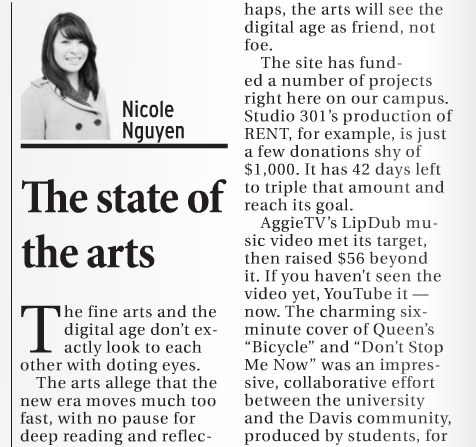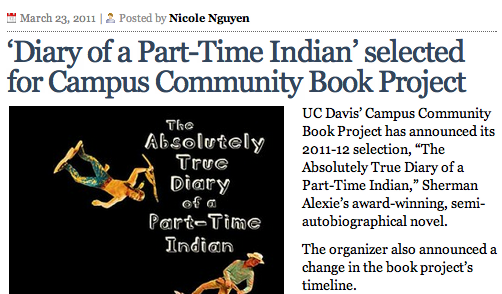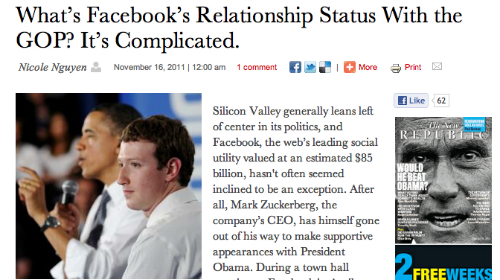Appeared in The California Aggie on June 4, 2012
In an effort to curb my serious case of senioritis, I am muting my social media accounts and minimizing my internet use until my undergraduate career has been put to rest. Only after the last answer is completed on the last scantron of my last final will I emerge. Starting today, I am (very begrudgingly) going offline.
The wide web is a dangerous world anyway and it might be an opportune time to stay away. That secret cyberwar program our president ordered? You know, the computer virus that intended to take down Iranian nuclear plants? Yeah, I wouldn’t want to get caught in the middle of that firefight.
Plus, there’s all that talk about the United Nations policing the internet and no one really wants that. Because that means China, Russia, Iran and Saudi Arabia would have equal say in organizing and controlling the web. Given the tendency of these countries to quiet the voice of their people and silence political dissidents, international regulation seems like a pretty poor idea. My stomach churns at the thought. No need in being online when there’s all that nonsense going on.
After I got to thinking about this last column, I realized that in these last few weeks I will be going offline in more ways than one. You see, an unfortunate side effect of graduating is that my time at The Aggie has run its course. And that means no more tech talk from me. It’s time for the tech talk to come from you.
Scientist extraordinaire Carl Sagan once wrote, “We live in a society exquisitely dependent on science and technology, in which hardly anyone knows anything about science and technology.” The internet has become so essential, so ubiquitous but, really, how much do we know about how it works or who is managing it? What about how it affects the way we communicate with each other or the way we share information?
Twenty-something weeks is too short a period to give due justice to these questions. But I encourage you to find out the answers for yourself –– especially you, students of the humanities and social sciences. No, I’m not telling you to drop your disciplines for hard science, but I do think that it’s up to the great thinkers of the world to answer the social, economic and philosophical problems that remain unaddressed in the virtual realm.
Sagan’s 1990 essay “Why We Need to Understand Science” is a good place to start. Twenty-one years later, his words still ring true. For a modern take, The Economist’s Ryan Avent will get you up to speed. Avent explains that the internet is a general-purpose technology, like electricity, whose power lies not in the medium itself but its ability to “transform existing industries, like media and retail.” So if you think you are somehow exempt from the reaches of the internet, you aren’t. You might as well join the party.
But, for now, I’m relieved that I am going offline. I’m at the CoHo watching two friends having intermittent bouts of conversation between browsing their phones and texting. It’s a painful sight to see and it hits a little too close to home. I can’t blame them because I, too, am guilty of this behavior. I too feel like my phone is constantly demanding something of me. That ping goes off and it’s like a bug bite waiting to be itched — the more you itch, the bigger the bite swells. I yield to the text (“Sorry, just one second”), hoping to quiet the stream of conversation, but I actually just enable it. It’s a vicious cycle, really.
So I need to escape the allure of the internet for a little while. I hope that in removing myself, I will better understand its meaning and value. I guess the same can be said of graduating from UC Davis. Congratulations, class of 2012.
NICOLE NGUYEN thinks that there are great offline alternatives in Davis, like Dr. Andy’s Monday night pub quiz (where there are no smartphones allowed, just smarts). Have a good summer and keep in touch at niknguyen@ucdavis.edu.


